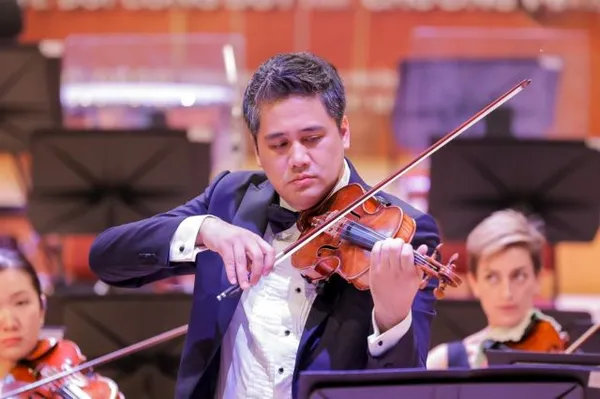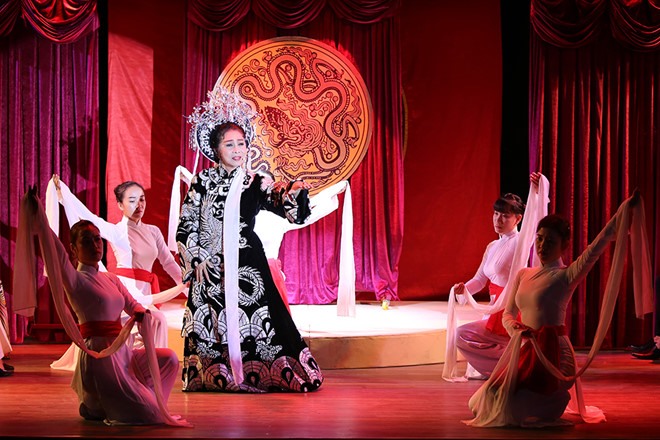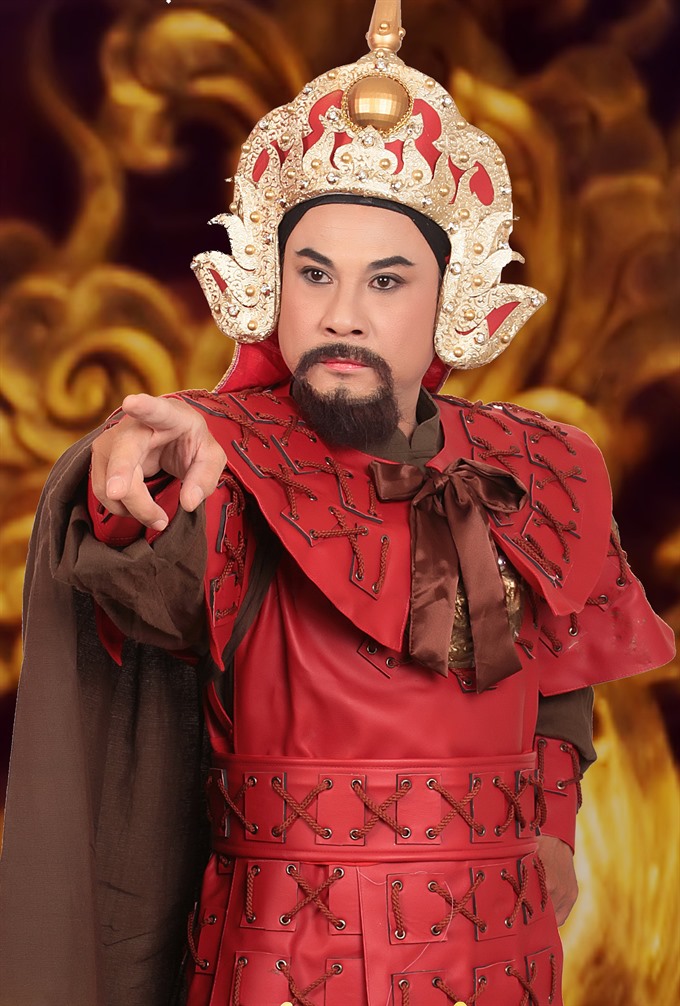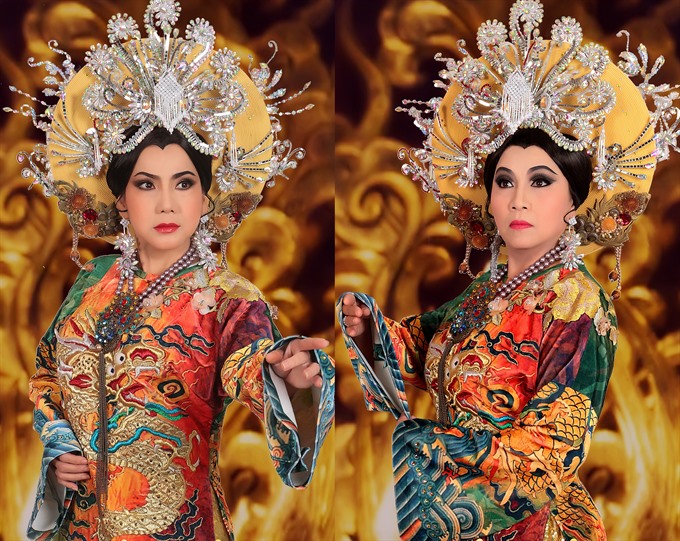 Life & Style
Life & Style

" />Historical plays staged by cải lương (reformed opera) artists are fueling love for the country and a new patriotic fervour among young and old audiences alike.
 |
| People’s Artist Bạch Tuyết, a guru of cải lương, believes traditional theatre should be changed to meet the tastes of young audiences. (Photo courtesy of Chợ Lớn Theatre) |
By Thu Anh
For her latest production, Thái Hậu Dương Vân Nga (Queen Mother Dương Vân Nga), theatre director and Meritorious Artist Hoa Hạ has retained the authentic language spoken by Vietnamese centuries ago, but has also imparted a contemporary twist through special costumes as well as sound and light effects.
The inclusion of veteran actors instead of an entire cast of young faces, as is customary in many local productions, is also expected to be a welcome change.
Meritorious Artists Phượng Loan and Kim Ngân, who have more than 30 years of experience in the industry, have both been cast in the role of Queen Mother Dương Vân Nga.
“Theatre lovers of different generations remember Thái Hậu Dương Vân Nga and its spirit,” says Hạ, the play’s producer and director.
“I believe in both Loan and Ngân, who are talented and experienced enough to offer a taste of what cải lương is like," she says.
To many in the audience at the play’s rehearsal last weekend, the results were dazzling.
“Many people watched Thái Hậu Dương Vân Nga in the 1980s and 90s, and the actresses this time have provided a great spectacle of passion, images and music,” saiys Phan Thu Hà, a resident of Tân Bình District.
“Loan and Ngân are talented but differ in performance styles. Loan is an alto, and Ngân a mezzo-soprano.”
“Both feature the inner beauty of Vietnamese women and display patriotism, bravery and sentiment through their work in Thái Hậu Dương Vân Nga,” she adds.
Thái Hậu Dương Vân Nga was first staged in HCM City in 1978, starring actress Thanh Nga as the Queen Mother.
The play is based on a chèo (traditional opera in north) screenplay by Trúc Đường and was rewritten for cải lương by Huy Trường. It became a hit after its premiere at Cao Đông Hùng Theatre in Bình Thạnh District.
 |
| Actor Chí Linh plays General Lê Hoàn in Thái Hậu Dương Vân Nga, first performed on stage in HCM City in 1978. It will be restaged by female theatre director Hoa Hạ in HCM City to celebrate 100 years of cải lương. (Photo courtesy of the producer) |
The play has been restaged many times with cải lương stars such as People’s Artists Bạch Tuyết, Ngọc Giàu and Thanh Sang.
“This year, I decided to restage a new version written by Hoa Phượng, Chi Lăng and Thẩm Hà Vân, to celebrate 100 years of cải lương,” says 61-year-old Hoa Hạ, who began her career in 1977.
The work portrays the life of Dương Vân Nga, who served as Queen Regent of the Đinh Dynasty after her husband, Emperor Đinh Tiên Hoàng, was assassinated in 979 and when her son was six years old.
Nga later ceded the Đinh Dynasty’s throne to General Lê Hoàn in order to defend the country before the invasion of the Chinese Song troops. Gen Hoàn led his army and expelled the enemy in 981.
Later, Lê Hoàn became the first emperor, named Lê Đại Hành, of the Early Lê Dynasty. Dương Vân Nga was the first queen in Việt Nam who married two emperors.
Today, Emperor Lê Đại Hành and Queen Dương Vân Nga are worshipped at the Temple of Lê Đại Hành in the former royal capital ciy Hoa Lư,, now Hoa Lư District in Ninh Bình Province.
The temple is located next to the tomb of Emperor Đinh Tiên Hoàng, Queen Nga’s first husband. People of different generations have mixed views about the queen’s life.
“The life and love of Queen Mother Dương Vân Nga is an endless source of passion for many authors and artists, and appears in many paintings, novels and plays of chèo (northern traditional opera) and cải lương,” says Hạ.
Highlights of Hoa Hạ’s work include a scene of Nga in yellow costumes, singing and dancing with support of the orchestra while she ceded the throne to Gen Lê Hoàn.
Hạ says she invited make-up artists and choreographers to help the actors perfect their characters.
She also hired pop star Phương Thanh to play a supporting role because she wanted to “bring a fresh wind to cải lương, an old and unique genre of southern theatre”.
Thái Hậu Dương Vân Nga will be staged at 8pm on May 6 and 13 at Bến Thành Theatre at 6 Mạc Đĩnh Chi St in District 1.
One of the industry’s few female directors, Hoa Hạ says that a great cải lương show today must include skilled artists and have an appealing and powerful stage presence.
She notes that although young audiences prefer comedies, they are willing to attend a serious play. "So I decided to work with a play with a historical story."
"Historical plays are like valuable books or films that contain lessons that help young people learn more about the country’s history, traditional culture and lifestyle," says Hoa Hạ, who spent more than VNĐ800 million(US$35,000) on the production.
Hạ’s creations, including Tuyên Phi Đặng Thị Huệ (Concubine Đặng Thị Huệ) and Công Chúa Huyền Trân (Princess Huyền Trân) based on historical events, have been praised by young audiences, including students and workers.
One of Hoa Hạ’s favourite plays is Trung Thần (Loyalist).
The 90-minute tragedy depicts the controversial life and death of Lê Văn Duyệt, a national hero who contributed to the growth of southern Việt Nam in the 19th century.
It features Duyệt as the commander of Gia Định Citadel, located in Biên Hòa and Sài Gòn districts, between 1813 and 1820 under Emperor Gia Long (Nguyễn Phúc Ánh), founder of the Nguyễn Dynasty.
Duyệt worked to build dikes and irrigation systems and was known for his military talent and fight against corrupt officials and sycophantic courtiers.
But after Duyệt’s death in 1832. His grave was destroyed by the emperor, who had handed out nine sentences of death to Duyệt, which in turn implicated his family.
In 1841, Emperor Thiệu Trị officially pardoned him, declaring that the great commander had been innocent.
“In Trung Thần, I used young artists Lê Tứ, Tú Sương and Điền Trung of the Trần Hữu Trang Cải Lương Theatre, all of whom depicted their characters well,” says Hoa Hạ.
Trung Thần attracted many young guests who filled the seats of the HCM City Drama Theatre in District 1 every weekend in December and January.
"Through my performance, I gained respect for national heroes and soldiers who sacrificed for the country’s independence," says young actor Quang Khải of the Việt Nam Cải Lương Theatre in Hà Nội.
Khải starred in the role of the communist and patriot Phan Đăng Lưu in Hừng Đông (Breaking Dawn), a production by Meritorious Artist Triệu Trung Kiên.
Lưu helped establish the Vietnamese Communist Party in 1930. He was caught and given death sentence by French colonialist in 1941.
Hừng Đông used music by HUB, a street band of young musicians and composers, to meet the current tastes of young people. The play has been staged in Hà Nội and HCM City.
“It’s wonderful to learn that cải lương is not just old but also contains the breath of modern life," said Nguyễn Thị Diệu, a second-year student of the HCM City University of Culture, who saw Hừng Đông at the the City’s Opera House.
“Cải lương is unique and it should be preserved,” she says.
Trung Thần and Hừng Đông will be restaged on April 29-30 to celebrate the 43rd Reunification Day on April 30.
 |
| Meritorious Artist Phượng Loan and veteran actress Kim Ngân (right) perform in Thái Hậu Dương Vân Nga (Queen Mother Dương Vân Nga), a historical play about Dương Vân Nga who served as Queens of the Đinh Dynasty and Lê Dynasty. (Photo courtesy of the producer) |
New projects
“Historical plays are keeping cải lương alive,” says Meritorious Artist Kim Tử Long of HCM City.
Long, in co-operation with a staff of skilled artists, has launched the drama project Ba Thế Hệ Về Lại Cội Nguồn (Three Generations Perform Cải Lương) at the Công Nhân Theatre in District 1.
His project is part of the city’s Association of Theatre Artists’ cultural activities to celebrate 100 years of cải lương this year.
Long’s project offers live shows featuring national heroes and soldiers, all of which were staged in the 1980s and 90s, such as Ngọn Lửa Thăng Long (The Flame of Thăng Long Citadel) and Tiếng Gọi Non Sông (The Voice of Country).
The project has attracted dozens of young and veteran performers from the city and southern provinces.
“Our project also aims to highlight the gurus of cải lương of different generations. We hope to encourage young audiences to learn more about traditional theatre,” says Long, adding that his project has received support from the City’s Television and Theatre Association.
Tickets prices are affordable, ranging from VNĐ50,000 (US$2.5) to 100,000 ($4.5) each.
In the near future, the play will also be staged in Hải Phòng and Hà Nội, he says.
People’s Artist Bạch Tuyết recently made waves after releasing her new MV, Em Gái Mưa (Rainy Girl) in cải lương, which used complex orchestrations and dazzling images.
In the MV, Tuyết adopted a romantic hit of 2017 by young pop star Hương Tràm. The MV attracted more than 400,000 hits on YouTube.
“Cải lương should be changed to meet the tastes of young audiences,” says the 73 year-old, who has more than 60 years in the industry.
“I began to love cải lương after viewing Tuyết’s MV, Em Gái Mưa, in the cải lương version,” says 21-year-old singer Tràm.
Young artists Võ Minh Lâm, Phương Hằng and Tuấn Cảnh plan to release their new MVs featuring famous extracts from historical plays on YouTube and online music channels.
Tuyết says that cải lương could be seen decades ago only at live performances. “So, the art’s expansion has been limited in modern society. MVs on YouTube will help bring the art to bigger audiences,” she says.— VNS









